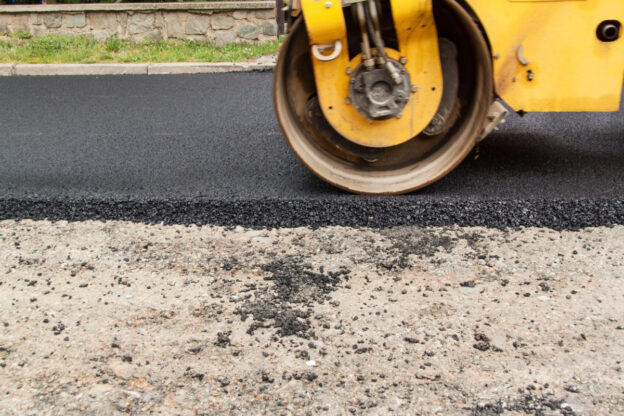Have you ever wondered about the environmental impact of the asphalt paving and sealcoating that we see around us every day? As our cities continue to grow, so does the demand for durable, cost-effective, and, most importantly, environmentally friendly paving solutions. But can asphalt paving and sealcoating really fit into this green equation?
In an era where sustainability is no longer a choice but a necessity, understanding the environmental implications of these commonly used materials is vital. We’ll explore the world of asphalt and sealcoating, exploring their eco-friendliness and how they contribute to sustainable development.
How Can Asphalt Paving Lead to a Better Environment?
Asphalt is everywhere, from the roads we travel on to the pavements we walk on. But did you know that this ubiquitous material is also environmentally friendly? Our asphalt paving specialists will show you how paving with asphalt can contribute to a more sustainable future.
Recyclable Material
Asphalt is 100% recyclable, making it one of the most reused materials in the world. After old asphalt pavement is removed, it can be crushed and reused in new pavement or other construction projects. Over 99% of the asphalt removed from roadways and parking lots every year is reused, significantly reducing the need for new raw materials and the environmental impact associated with their extraction and processing.
Energy-Efficient Production
Warm-mix asphalt technologies allow the mixture to be produced and placed at lower temperatures than traditional hot-mix asphalt. This leads to several environmental benefits, including reduced energy consumption during production, lower emissions of greenhouse gases and other pollutants, and improved conditions for workers due to less heat and fumes.
Long-Lasting Durability
Asphalt pavements are incredibly durable and can withstand heavy traffic and harsh weather conditions. This longevity reduces the frequency of replacement and maintenance, further conserving resources and minimizing environmental impacts.
Noise Reduction
Asphalt’s smooth surface helps reduce vehicle noise, leading to quieter neighborhoods and less noise pollution. Some asphalt mixtures are specifically designed to absorb sound and further reduce traffic noise.
Permeable Asphalt
Permeable asphalt is a special type of pavement that allows water to pass through it, reducing runoff and helping to recharge groundwater supplies. It can play a key role in managing stormwater and reducing the impact of urban development on local water bodies.
Can Sealcoating Be Eco-Friendly?
Every aspect of our lives is under the eco-friendly microscope, and sealcoating is no exception. This protective barrier, known for its role in extending the life of our roads and driveways, is slowly joining the cause and stepping into the eco-friendly spotlight. Here’s how this common practice is making strides in the environment.
Use of Eco-Friendly Sealers
A significant advancement in the sealcoating industry is the development of eco-friendly sealers. These products are made from renewable resources and have lower levels of volatile organic compounds (VOCs), making them less harmful to the environment. They also contain no coal tar, a common ingredient in traditional sealers associated with health and environmental concerns.
Water-Based Sealers
Water-based sealers, like asphalt emulsion sealers, are another environmentally friendly option. They contain fewer chemicals and toxins compared to solvent-based sealers and are less likely to contribute to air pollution.
Improved Energy Efficiency
Sealcoating provides an additional layer of protection to the asphalt, helping to slow the oxidation process and reduce damage from UV rays. This extends the lifespan of the pavement and reduces the need for frequent repairs and replacements, thereby saving energy and resources.
Reducing Heat Islands
Sealcoated surfaces, particularly those using lighter-colored sealers, can help mitigate the urban heat island effect. These surfaces reflect more sunlight and absorb less heat, resulting in lower surface temperatures and contributing to cooler urban environments.
Pair Your Asphalt Paving With Sealcoating Today!
It’s time to put these eco-friendly practices into action in and around your property. If you’re in New Jersey and looking for sustainable paving solutions, don’t hesitate to reach out to Stanley Paving. With a commitment to environmentally friendly practices and years of experience, our asphalt paving and sealcoating services in NJ are ready to help you make your paving projects greener. Contact Stanley Paving today and be a part of creating sustainable cities for tomorrow.






 866-WE-TOP-EM
866-WE-TOP-EM